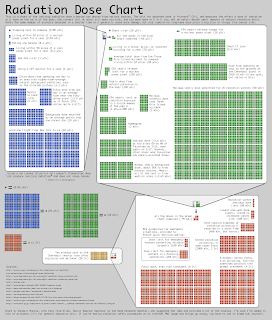Putting Fukushima In Perspective
This excellent chart puts in perspective the various amounts of radiation we might be exposed to. I know you can't read the reduced version shown here, so click on the image or go to the xkcd site to see the full-sized image. That site also has links to supporting information.
Yes, too much ionizing radiation can be very dangerous. But "too much" is a lot. We all tolerate minor amounts every day of our lives.
Smoking Sieverts
The chart doesn't include the very significant additional radiation exposure that tobacco smokers expose themselves to. (Info at this EPA site. The U.S. Army Corps of Engineers has a pdf here with some exposure examples.) This University of Iowa site says someone who smokes a pack and a half of cigarets a day exposes himself or herself to a dose of 1300 mrem/year, equivalent to a chest x-ray for each cigaret. That's one of the green boxes in the chart above per smoke. Second-hand smoke is similarly radioactive.
Nobody who smokes should complain about radiation. They expose themselves to more than anyone living around Fukushima is likely to receive. No tsunami required.
The Sievert Measures a Radiation Dose's Effect on Us
The sievert is the SI unit used to compare the effect of doses of ionizing radiation on the body. Different kinds of radiation have different effects, and different parts of the body are affected differently. The sievert takes this into account so we can compare, for example, the effect of the extra radiation received during an airplane flight with the extra radiation received by visiting Chernobyl. [Wikipedia article here.] Sieverts (Sv) and microsieverts (μSv), millisieverts (mSv) and so on are used in the chart above.
David Wheat's Science In Action site has articles about science and math in the real world, weird science, science news, unexpected connections, and other cool science stuff. There is an index of the articles by topic here.
[Cross-posted from Doc's Green Blog.]


4 comments:
I DONT EVEN KNOW WHAT YOUR PARAGRAPH IS SAYING
...And that's why you need (or needed) to stay in school!
Really interesting information. The other day I saw an infographic about all radiation levels. It was also amazing to see.
All the best,
Gerard
Thank you so much for your nice blog my friend.
wish you best.
also more scientific websites which I know:
Brain -
Ecology -
Dinosaurs -
Science -
Computer -
Health -
Space -
Astronomy -
Dino Dinosaurs
Post a Comment